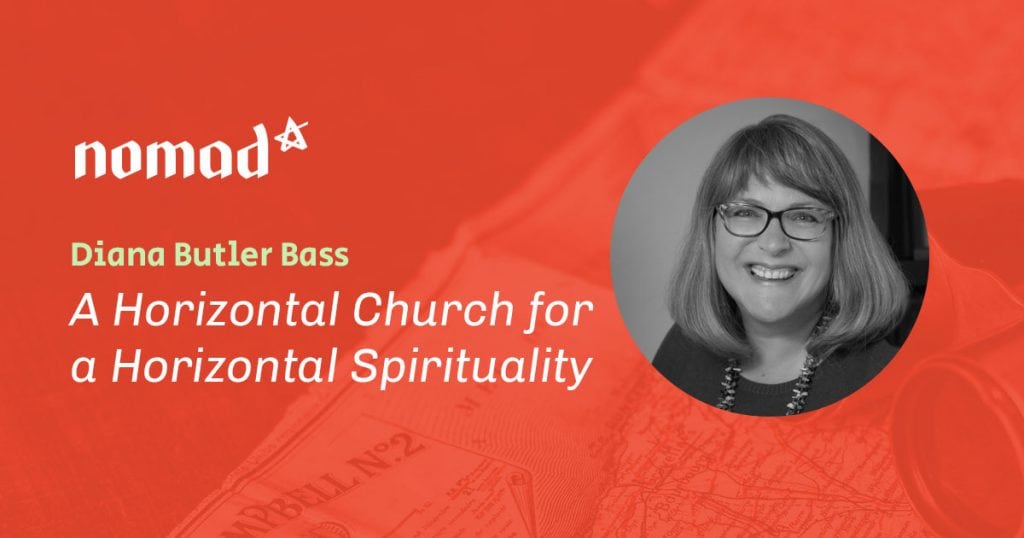The question ‘who is God?’ used to be the starting point for religious reflection, but increasingly spiritual seekers are concerning themselves with the question ‘where is God?’. We ask historian, religious commentator and author Diana Butler Bass about her faith journey and how her shift from a vertical to a horizontal theology dramatically reshaped her faith and understanding of Church.
Interview starts at 6m 16s

Image provided by Diana Butler Bass. Used with permission.
BOOKS
Grounded: Finding God in the World-A Spiritual Revolution
Christianity for the Rest of Us: How the Neighborhood Church Is Transforming the Faith
A People’s History of Christianity: The Other Side of the Story
QUOTES
“I was still hanging on to the shards of a universe that was structured vertically, which is that God lives in heaven, we’re here on earth and the possibility of hell looms under our feet. And I think it’s this vertical construct that so many people just don’t believe in any more – science doesn’t have anything to say about that – we’ve moved completely away from that in science; philosophy has abandoned the construct; and so theology is still sitting in this space where we’re holding on to this ancient construct that may or may not be biblical – I actually think it was in the Bible more because of culture than it having any relationship to reality from God’s perspective.”
“I’ve relocated the idea of transcendence to the horizon. Rather than thinking of God’s transcendence as up, I’ve started thinking of God’s transcendence as just beyond our sight lines. And so, that idea of a horizon, being a horizon of faith, is very powerful – that we live in a sort of horizontal landscape where God is both close and God is far away but God’s distance is not such that we have to get in a rocket ship to get to God but instead we just keep moving towards the horizon – and then there’s that mystery, of course, that the horizon always moves the closer you get to it.”
I found this interview very refreshing, and I know I will listen to it several times more because it so resonates with my own journey and current thought processes on the topics discussed.
Thank you, Tim, Dave, and Diana Butler Bass!!!
So glad you found it helpful, Judy. Like you, Diana really put into words where I’m at in my faith journey! Tim
Thanks guys for your thoughtful podcast. I appreciate (mostly!) the challenge that the interviewees bring. I am listening to the podcast where you interview Diana Butler Bass. I found what she said very interesting and understand I think how she has got to where she is. I have asked many of the same questions at various times. The most intriguing thing about the interview is that she never mentioned Jesus (maybe one mention of Christ). When she quoted “where two or three…” she applied it to God rather than mentioning Jesus. You guys then continued the conversation referring to the communion table without mentioning Jesus. As Christians (Jesus Christ-ians, followers of Jesus), how we know God is knowing Jesus. The incarnation is how God becomes “with us”. We know God through the Spirit of Jesus because we are “in Christ”. Any search for an experience of God that is not Christo-centric seems to me to be doomed to failure. I am still listening with 3 minutes to go to the end and you have still not mentioned Jesus. Isn’t that a little strange for a Christian podcast? (Ahhh at 2:43 a mention of Jesus.) Blessings. David.
Hi David,
Thanks for dropping us a line. Glad you’ve been finding the podcast helpful.
Me and Dave very much consider ourselves followers of Jesus. The only reason we wouldn’t explicitly mention Jesus by name is that we both know who we’re referring to when we say ‘God’, i.e. we’re referring to the God that is revealed in Jesus. So because it’s a Christian podcast, and we largely interview Christians and our audience are predominantly christians, we assume people know what we mean when we say ‘God’. Hope that makes sense. Tim